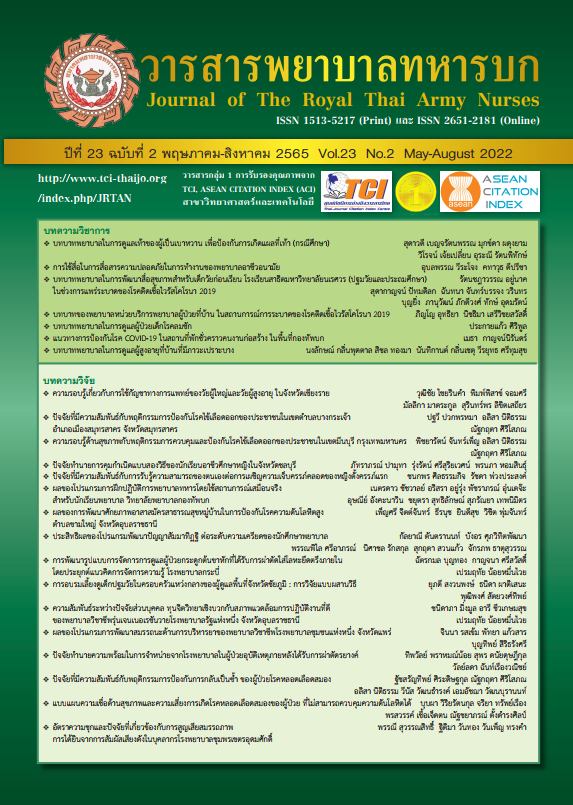The Effect of An Online Lesson on the Calculation Competence of Medication and Intravenous Fluids in Nursing Students
Keywords:
Calculation Competence of Medication and Intravenous Fluids, Nursing Students, Online LessonAbstract
This quasi-experimental research aimed to study the effect of an online Lesson on the calculation competence of medication and intravenous fluids in Nursing Students, a two-group pretest-posttest. The sample was a number of 78 first-year police nursing students enrolled in the Fundamental nursing course in the academic year 2020. The systematic randomizing was divided into an experimental group using the online lesson and a control group using conventional learning. The experiments were conducted over four weeks, and data were collected using: 1) Online Lesson, 2) The knowledge and skill test on the calculation of drugs and intravenous fluids, and 3) The online lesson satisfaction assessment. The data were analyzed by 1) Comparing the average scores of knowledge and skills in the calculation of drugs and intravenous fluids of the students in the experimental group by using a statistical method, paired t-test, 2) Comparing the average scores of knowledge and skills in the calculation of drugs and intravenous fluids between the experimental group with the control group by using a statistical method, independent t-test, and 3) Analyze students’ learning satisfaction toward using the online lesson by using the statistical mean and standard deviation.
The results showed that the average scores after learning of the experimental group and the control group were higher than before learning those, and comparison between the experimental group and the control group, the results showed that the average scores of the experimental group were higher than the control group, significant at the .01 level (p<.05)
Downloads
References
Rattanadetsakul C, & Rattanadetsakul P. Medication error and Uses in Drug Management Systems. Continuing Education Documents, Phaemaceutical practitioners, Phaemacycouncil. 2017. (inThai)
Thewthanom K, & Thananonniwas S. Medication error and Prevention guide for patient’s safety. Veridian E-Journal. 2009; 2(1): 155-217. (inThai)
McMullan M, Jones R, & Lea S. Patient safety: numerical skills and drug calculation abilities of nursing students and Registered Nurses. Journal of Advanced Nursing. 2010; 66(4), 891–899.
Brady A-M, Malone A-M, & Fleming S. A literature review of the individual and systems factors that contribute to medication errors in nursing practice. Journal of Nursing Management. 2019; 17, 679-697.
Sutharaphan S, & Saenpanya T. Developing clinical practice guidelines for preventing discrepancies in drug administration to patients, Phare Hospital. Journal of Nursing Division. 2009; 36(3): 76-95. (inThai)
Choudhary R. The impact of targeted mathematics/ numeracy tutorials on maths anxiety, numeracy and basic drug calculation exam marks. Journal of Academic Language & Learning. 2017; 11(1): A1-A22.
Guneş UY, Baran L, & Yilmaz D. Mathematical and Drug Calculation Skills of Nursing Students in Turkey. International Journal of Caring Sciences. 2016; 9(1): 220-227.
Police Nursing College. Bachelor of Nursing Science Program (Revised curriculum in 2017). Copies of documents; 2017. (inThai)
Hodgkinson B, Koch S, & Nay R. Strategies to reduce medication errors with reference to older adults. Int J Evid Based Healthc. 2006; 4: 2-41.
Ministry of Education. Announcement of the Ministry of Education: Undergraduate qualifications Bachelor of Nursing Science, 2017. (inThai)
Angsuchoti S. The 21th Century Workforce Competencies Development Model. Sukhothai Thammathirat Journal. 2018; 30(2): 124-140. (inThai)
Kunoy C. The development of electronic lessons used in the course of teaching, anatomy and physiology for Nursing Students at Boromarajonani College of Nursing, Chakriraj. Nursing Public Health and Education Journal. 2019; 20(3): 174-186. (inThai)
Panyu J, Saehung S, Kongsaktrakul C, Jongaramrueng J, Srichalerm T, & Wongdaeng A. The Effect of Computer-Assisted Instruction of Pediatric Medication Administration on Medication Administration Skills among Nursing Students. Journal of The Royal Thai Army Nurses. 2019; 25(2): 181-194. (inThai)
Thato R. NURSING RESEARCH: CONCEPTS TO APPLICATION. 3thed. Bangkok: Chulalongkorn University; 2018. (inThai)
Songkharm N. Multimedia for Learning: Design & Development. Bangkok: Chulalongkorn University; 2010. (inThai)
Na-songkhla J. Web-based instructional design in e-learning systems. Bangkok: Chulalongkorn University; 2004. (inThai)
Brahmawomg C. Developmental Testing of Media and Instructional Package. Silpakorn Educational Research Journal. 2013; 5(1): 1-20. (inThai)
Vichean U, Aukhapatsakun P, & Srichanchai U. E-Learning Lesson Model for Students Through the Network. Business Review Journal. 2019; 11(1): 231-242. (inThai)
Panpeng Y. INSTRUCTION DESIGN BY E-LEARNING SYSTEM. Sripatum Chonburi Journal. 2013; 21-27. (inThai)
Meenasantirak A, Wangwun P, Siripitakchai C, Plodpluang U, & Muenthaisong S. Development of Wound Dressing E-Learning Lesson for Nursing Student in Srimahasarakham Nursing College. Nursing Journal of the Ministry of Public Health. 2018; 145-155. (inThai)
Downloads
Published
How to Cite
Issue
Section
License
Copyright (c) 2022 Journal of The Royal Thai Army Nurses

This work is licensed under a Creative Commons Attribution-NonCommercial-NoDerivatives 4.0 International License.
บทความหรือข้อคิดเห็นใดใดที่ปรากฏในวารสารพยาบาลทหารบกเป็นวรรณกรรมของผู้เขียน ซึ่งบรรณาธิการหรือสมาคมพยาบาลทหารบก ไม่จำเป็นต้องเห็นด้วย
บทความที่ได้รับการตีพิมพ์เป็นลิขสิทธิ์ของวารสารพยาบาลทหารบก
The ideas and opinions expressed in the Journal of The Royal Thai Army Nurses are those of the authors and not necessarily those
of the editor or Royal Thai Army Nurses Association.






